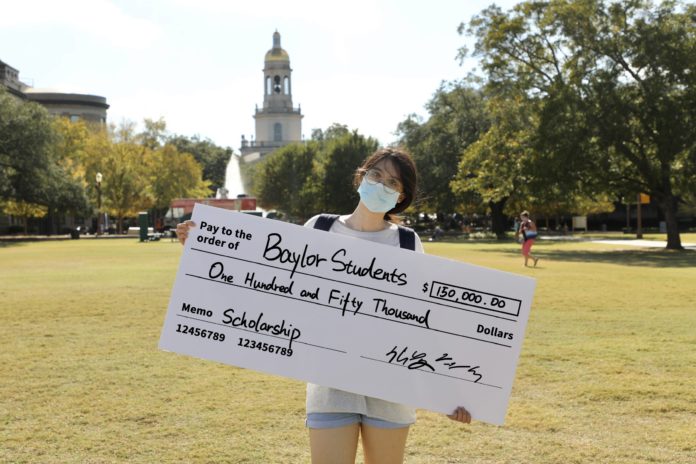
By Meredith Pratt | Staff Writer
64 students. That is the record-breaking number of Baylor applicants for the Fulbright U.S. Student Program this year.
Sponsored by the U.S. government, the Fulbright program was first signed into legislation in 1946 by President Harry S. Truman. Through this initiative, grants are provided to recent graduates, master’s and doctoral candidates, and young professionals — giving them the opportunity to travel to one of over 140 countries to teach or conduct research.
“For a bit of perspective, our record high before that was 23 last year,” said Dr. Andy Hogue, Fulbright advisor and associate dean for engaged learning. “Baylor has a tremendous track record with Fulbright. We plan to continue growing our numbers and to become one of the country’s top producers of Fulbright winners.”
With the COVID-19 pandemic, the Fulbright Foreign Scholarship Board has been closely monitoring the number of cases in each partner country. The program sends approximately 1,900 U.S. students abroad and receives 4,000 foreign students annually.
“Fulbright is a global program and is tailoring its plans on a country-by-country basis to resume in-person exchanges for U.S. participants after January 1, 2021. These plans will take into consideration the varying degrees to which the pandemic is affecting countries and communities around the world,” the official statement released by the organization said.
Hogue said COVID-19 has impacted some of this year’s Fulbright finalists, as well as several of those who applied to go next year. Those who were sent home from their Fulbright program will be given the opportunity to go again next year.
“It varies from country-to-country, largely dependent on travel restrictions,” Hogue said. “For this group who just applied, the message now is ‘all systems go.’ We’re hoping all these winners will be able to go as scheduled next fall.”
Austin senior Emmy Frigo said she first considered applying for a research Fulbright but ended up applying for an English teaching assistant position in Taiwan.
“I knew I wanted to take at least one year off between undergrad and law school, if not more, and I was looking at different programs and scholarships that allowed me to do that,” Frigo said. “Fulbright is one of the more prestigious ones, and it’s honestly something I’m really interested in.”
Frigo met with Baylor’s Fulbright advisors and submitted a personal statement and a statement of grant purpose leading up to the national application deadline Oct. 13. Now that the application deadline has closed, students will have to wait until Jan. 31 to find out if they were chosen as semi-finalists. From there, the semi-finalists will undergo more interviews until the finalists are selected in March.
Frigo said she doesn’t see the situation as a competition because students at Baylor have applied to many different countries.
“It’s like I’m not competing against all other Baylor students,” Frigo said. “I’m competing against, like, two others that are applying to Taiwan.”
Frigo’s spring semester studying abroad in Bologna, Italy was cut short due to the coronavirus outbreak. However, she is optimistic about Taiwan, where “coronavirus has been almost non-existent.”
“Yeah, I’m not too worried,” Frigo said. “If anything, it’s worse here, you know. I have a friend [Lauren Barnes] who’s actually doing the Fulbright in Taiwan right now, so I reached out to her, and she said it’s been great. She’s actually doing a second year of it.”
Peachtree Corners, Ga., senior Syd Harrell also applied for an English teaching assistant position, and the destination she chose was Rwanda.
“I have always wanted to live for a season in Africa,” Harrell said. “Specifically, I wanted to apply for Fulbright in Rwanda because it is the opportunity to teach English, and Rwandan culture is beautiful and fascinating.”
Harrell said she actually had plans to be in Rwanda this summer but was unable to go due to the pandemic. However, she said she is excited for the opportunity to get to spend even more time there if she is selected.
“Fulbright would let me be there longer, and I would get to teach and spend time building friendships with the people,” Harrell said.
Advising students like Frigo and Harrell has been a more-than-enjoyable process for Hogue.
“Our office works with them through every stage of the process, from recruitment to brainstorming, to essay draft after essay draft, all the way up to submission,” Hogue said. “It’s a deeply fulfilling journey.”
Hogue said he’s even been able to learn from the students through discussions about their proposed destinations.
“Did you know they speak Tajik in Tajikistan, that there is a growing number of Albanians in North Macedonia or that Cardiff, Wales is the vanguard of environmental sustainability? I didn’t either until I interviewed three of our incredible students who are proposing to go to those places on Fulbrights next year,” Hogue said.
“Whether or not they win, I suspect every applicant will tell you they are glad they put forth the effort to apply because it forces them to ask important questions of themselves and of their place in the world,” Hogue said. “In that respect, we have achieved all we could hope for. Still, we want them all to win. So we hope, come spring, we’re celebrating a record number of Fulbright winners.”
Hogue said he would recommend all Baylor students to look into the Fulbright program or other academic scholarship programs post-grad.
“Fulbright wants to send bright people to interesting places to do meaningful work and represent the United States as a cultural ambassador, all on their dime,” Hogue said. “When else in your life do you get that opportunity?”





